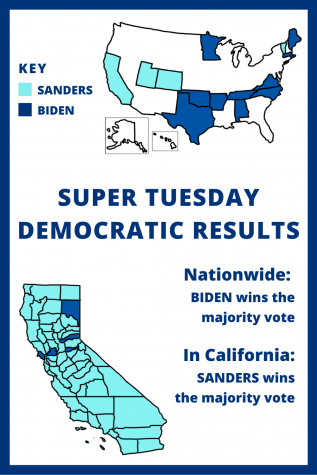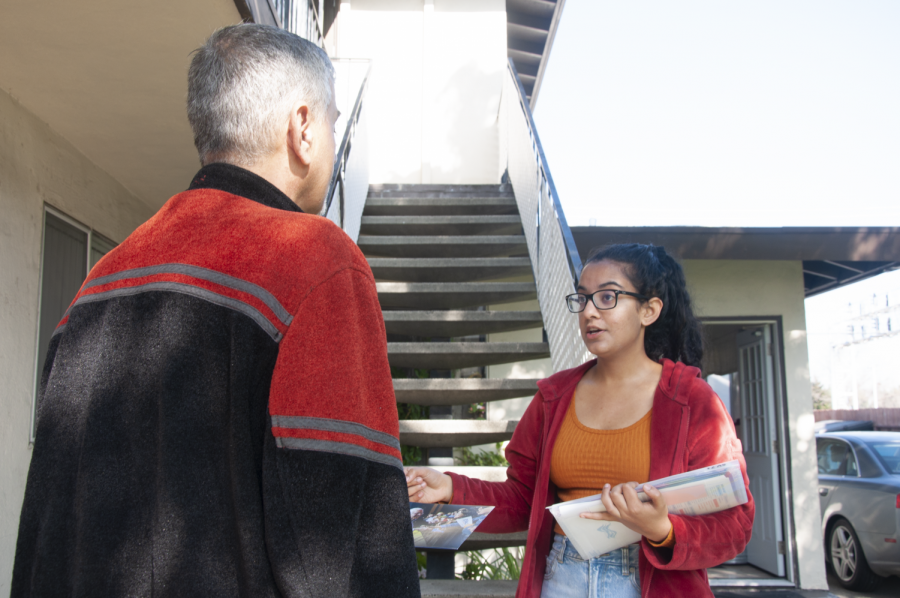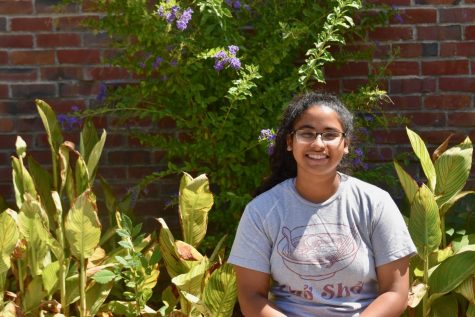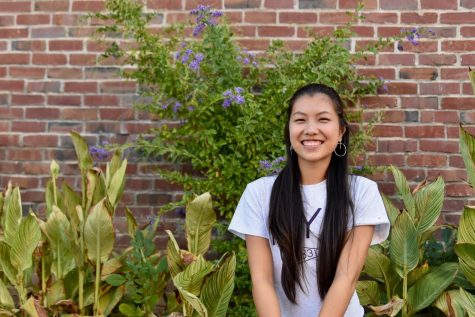The Blue Wave: Teen involvement in California primaries
Local community members discuss their involvement in the political process
Senior Rukmini Banerjee informs a Sunnyvale resident about the California primary process.
March 11, 2020
Clipping pins to his suit as he eyed the side door of the debate, senior Tedman Chai tried to look as official as possible. He wasn’t allowed to watch the debate, but he was too curious. He confidently strode past the two security guards and walked into the room, with no one ever suspecting him.
Chai was in San Francisco at the time, attending the 2018 California Democratic Party State Convention as an intern. His passion for politics expanded after his successful entrance into the room of speaker events and panels.
“It was just the fervor of the room and the intensity of the things that they’re saying,” Chai said. “There’s speaker events or panels that just seem to go nonstop, only punctuated by the conversations in the room. I think that was when I got an overwhelming sense of passion, and to borrow Hamilton lyrics, ‘That’s the room where it happens,’ right? And I really wanted to be in that room.”
In addition to serving as the chair of the California Youth Policy Alliance for more than a year, Chai spent two months interning for the Santa Clara Democratic Party, where he had the opportunity to organize events, fundraisers and community engagement. After working at the state level, Chai enjoyed the change of pace through interacting with local representatives who determined policies that directly affected the community.
Similarly, Tracy Edwards, who serves as the a co-president of the League of Women Voters’ (LWV) chapter in Cupertino, has been involved in local civic engagement for almost 30 years. LWV is a nonpartisan political organization that aims to educate people in their community about ballot measures and other policies by holding forums and voter registration drives. Last year, she visited MVHS history classes to pre-register 16 year olds to vote.

“Your generation and my generation [Baby Boomers], are the two big lumps of populations that are swirling through our society, and you’re a really important demographic,” Edwards said. “We really care that you get engaged and we try to make that point. So we hope we leave you feeling that you’re important, you’re going to be listened to and you have a very valuable asset called your vote that you need to exercise.”
Senior Rukmini Banerjee pre-registered with the LWV last year and voted for her presidential candidate, Bernie Sanders, in the primaries that occured on March 3. To grow more involved in the political process, she canvassed for the Sanders campaign by going door-to-door to inform Sunnyvale residents about his platform and the general election process. For her, the experience was eye opening, as she said she was in a lower-middle class area where she thought that many people didn’t care much about politics because they simply didn’t have the time. While she understands this situation, she also believes it is her responsibility to try and help them get involved.
“I feel like the best way you can be active in the political process is by using your actions and your words to try to convince people to vote,” Banerjee said. “For someone who is young, who still has energy, and who still believes in the process, go for it.”
Along with the lack of time that citizens have to learn more about the political process and because California has been a historically blue state, Chai finds that many voters — specifically young voters — don’t believe that their one vote will make a difference. He empathizes with this, but highlights that since many young voters choose not to vote, those who do are not represented accurately in the electorate.
“I think, as a generation, Generation Z, I think it’s very evident that we care about our futures,” Chai said. “We’ve seen youth organizations pop up at the grassroots level across the nation. But at the root of our issues, I believe is an inability for us to compel change, even with the force of our plans, as the 18 to 29 year old electorate has the lowest voting turnout of any age group. Our legislators really have no reason to listen to us, and until we make it obvious that their jobs are contingent on our futures, that won’t change.”
On another note, Edwards also emphasizes that voting contributes to more than just party-based elections such as the presidential election: the ballot affects everyone’s lives in some way or another.
“People say ‘What difference does my vote make? I know what the outcome is going to be,’” Edwards said. “But that’s just a few of the things that are on the ballot. Your city council is neither red nor blue. Your school board isn’t red or blue. The ballot measures aren’t red or blue. There’s so many things that affect your life that are on the ballot that require you to participate, for which the outcome is not predetermined.”
Banerjee agrees with both Edwards and Chai, acknowledging the destructive nature that comes with a lack of political efficacy. Those who are vocal about not voting tend to influence others to do the same, only exacerbating the negative cycle of inaction.
“Even if you think that someone else is going to be doing the work for you so it doesn’t matter what you have to say, every single vote matters,” Banerjee said. “If you tell yourself your vote doesn’t matter, if you tell your friend that their vote doesn’t matter, if they tell their friends and the cycle goes on, you’re just going to have a group of people who don’t want to use their voice for something that will actually affect them in the future.”
For Chai, civics has given him constant contact with others who are just as passionate and driven about the same topics. Though he might not have realized it at the time, the room that he snuck into changed the course of his interests and career trajectory.
“When I’m involved in civics, I just feel like [I have] a great sense of purpose, like what I’m doing actually matters,” Chai said. “And for me, it’s not even completely altruistic. It’s just a desire for how I spend my time to be worth something and I see no greater place for that than in politics. I think that the people that I’m constantly surrounded with are just so like intoxicatingly and infectiously passionate about what they do, and that’s something I want to be around.”





























